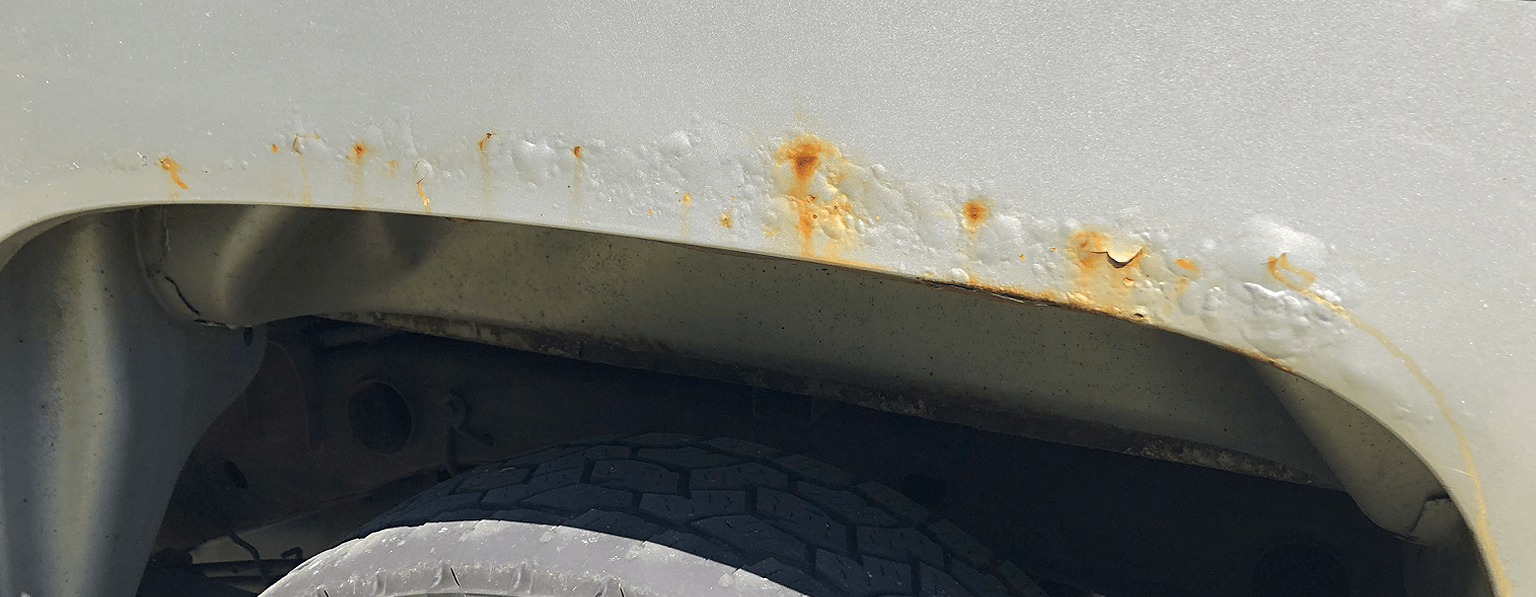Last Updated on April 19, 2024
If you’re a car owner, you know that rust can be a real problem. It’s not only unsightly, but it can also damage the structural integrity of the vehicle. So what causes rust on cars?
Rust forms when unprotected metal is exposed to oxygen and moisture. This exposure results in an atomic reaction resulting in oxidation of the metal. When left untreated, oxidation, also commonly referred to as rust, will eventually eat away the metal.
Rust is a car’s natural enemy. Even the slightest hint of surface rust can be a sign of more serious oxidation lurking behind a body panel. The first and most obvious sign of rust can be indicated by a small brown or orange tinge on any metal surface. This unsightly phenomenon not only is an eyesore, but when left unchecked has the potential danger of reducing structural integrity of the vehicle.
Let’s take a look at the causes of rust and some tips for preventing it. Let’s jump into this, shall we.
Why Do Some Cars Rust And Others Do Not?
The difference between a car that rusts and one that doesn’t is much more than just luck. It all depends on the quality of materials used in its construction. For example, vehicles that make use of aluminum over traditional steel will be less likely to experience the effects of rust. And unlike steel or iron, when aluminum is exposed to air and water, it reacts with the oxygen to form a thin coating of aluminum oxide that bonds to the surface.
The effects of this natural process produces a thin white film covering the exposed aluminum. This film can be easily removed without affecting the surface. Steel on the other hand, begins to oxidize and rust away.
Worst States For Car Rust
Without a doubt, a big factor for what causes rust on cars is where you live. If you happen to live in one of the northeastern states, your trusty vehicle will be exposed to salt in various forms.
If you live in one of these states, you might want to invest in a good rustproofing treatment for your car.
- Connecticut,
- Delaware,
- Illinois,
- Indiana,
- Iowa,
- Maine,
- Maryland,
- Massachusetts,
- Michigan,
- Minnesota,
- Missouri,
- New Hampshire,
- New Jersey,
- New York,
- Ohio,
- Pennsylvania,
- Rhode Island,
- Vermont,
- Virginia,
- West Virginia,
- Wisconsin,
- and Washington D.C.
Either in the air or on the road, it’s the reason these states are commonly referred to as the “rust-belt” states.
The Environment is Number One Reason For What Causes Rust on Cars
The Environment is a huge issue when it comes to rust on cars. Many experts believe that the environment is the single biggest factor for why cars rust.
While that may be true to some extent, there are other factors at play as well. For example, salt can accelerate the rusting process, so if you live in an area with a lot of salt in the air, that could be why your car is rusting more quickly than others.
Let’s take a look at the two main environmental factors that cause vehicles to rust.
Salty Air
Cars that are located near the coast often rust faster than those in other locations. This is because salty air combines with water to form an environment perfect for corrosion. When your vehicle is exposed to this long-term, the salty air and moisture begins to seep into the pores of the metal. This leads to oxidization, resulting in–you guessed it, rust!
Surprisingly, coastal air can even lead to brand new cars to rust. The combination of the sun and salty air near a coast can destroy a car’s finish. Because the hot sun increases the pores in the paint, the result is an absorption of salty moisture. The end result is, well corrosion.
Road Treatments
Winter road treatments are another reason for cars in the northeastern states being more prone to rust. State government trucks dump large amounts of chemical compound onto the roads each winter. While these chemicals are great for melting ice, they are not kind to your cars painted surfaces. Not to mention, they tend to get all over your pants and coat too!
No doubt, cars located in the “rust-belt” will at some point begin to rust. But you can take some preventative measures to reduce this rust. More on that below.
What Kind Of Rust Do Cars Experience?
If you live in an environment with high levels of moisture, it’s inevitable that your car will accumulate rust. And truth be told, almost all cars will have some form of rust eventually. It’s important to understand the three different types of rust: surface, scale and penetrating. Let’s examine each.
Surface Rust
Surface rust is the most common and least damaging to a car. Often times surface rust will appear on metal surfaces underneath the car. Places highly sustainable to moisture, such as suspension components or brake parts.
Other times surface rust will appear when your car’s paint is scratched and the metal is exposed. Moisture then starts to make its way into the metal, forming surface rust. When caught early enough, it’s easily removed.
Scale Rust
Scale rust is more damaging to metal, and has the potential to eat small holes into the surface. Typically, this type of rust requires a professional to remove.
Penetrating Rust
Then there is the worst of all types of rust – penetrating rust. This is the type of rust that disintegrates the metal. Penetrating rust causes large holes in a vehicles body. It even has the potential to rust away critical components, such as brake lines and the vehicle frame.
Penetrating rust is often very difficult to fix. Rather than fix the corroded areas, technicians may need to replace parts of the car. Corroded brake lines as one example need to be replaced.
When left unchecked, penetrating rust can even become a safety hazard.
Do Car Warranties Cover Rust?
Yes, since rust may damage critical components it’s often covered under the factory warranty. However, auto manufacturers offer varying degrees of protection. Some will have warranties against corrosion, while others offer only guarantees regarding damage from rust.
Many dealerships offer extended warranties that may cover damage from rust. It’s best to read the fine print to truly understand the full coverage of the warranty. You will want to make sure that what causes rust on cars is covered.
What Are The Best Ways To Prevent Your Car From Rust?
Believe it or not, it’s pretty simple to prevent rust and it starts by keeping your car washed and waxed regularly. Washing your car in the winter is particularity important for more than just preserving its beauty. The salt from roads can do a number on it, damaging paint and allowing rust to form.
During the cold winter months have your car washed every week. Look for a car wash that also cleans the undercarriage.
Make sure to keep an eye on your paint. When you see a small chip in the paint, clean the area and use a little touch-up paint. This will keep your vehicle’s finish from getting worse.
What Should I Do If My Car Begins To Rust?
So far we covered what causes rust on cars, but not what to do when your car begins to rust. Surface rust in reality is an easy fix. And pretty common. But anything a little more extreme may require an expert. So it’s best to make a trip to your local body shop or car dealership.
Final Thoughts: What Causes Rust On Cars
While rust can be a nuisance, it is easy to prevent with some simple steps. Car manufacturers apply anti-rust coating during the manufacturing process. Often times however, the coating will be chipped away when exposed to stones, road salt and water. Regular washing and waxing will help keep your car looking new and protect it from corrosion. If you do find rust on your car, take action quickly to remove it before it has a chance to eat away at the metal.
By following these tips, you can keep your car in great condition and avoid the hassle of dealing with rust.

Managing Editor
Christopher is an automotive technical writer. When he’s not at the local autocross event, he can often be found working on one of his cars. Specializes in automotive class action law, industry trends, and automotive maintenance. Email me direct, or learn more about us

